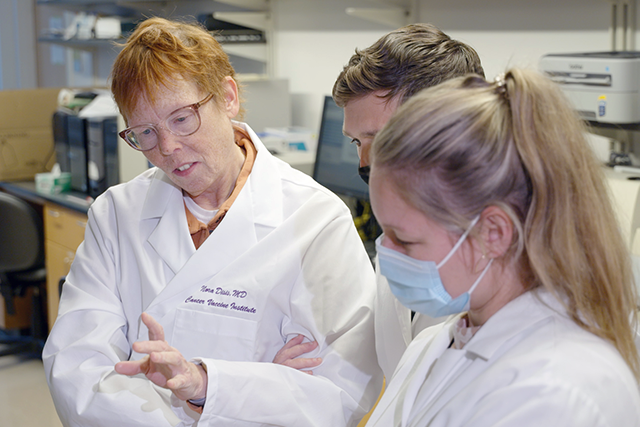
Breast cancer vaccine safely generates anti-tumor immunity
Recruiting patients
The phase II trial is recruiting patients; contact the research coordinator for more information: 206-543-3829.
An experimental vaccine against breast cancer safely generated a strong immune response to a key tumor protein, researchers report in JAMA Oncology. The findings suggest the vaccine may be able to treat different types of breast cancer.
“Because this was not a randomized clinical trial, the results should be considered preliminary, but the findings are promising enough that the vaccine will now be evaluated in a larger, randomized clinical trial,” said lead author Dr. Mary “Nora” L. Disis, a UW professor of medicine, Division of Medical Oncology, and director of the Cancer Vaccine Institute.
The phase I trial was designed to evaluate the safety of a vaccine that targets a protein called human epidermal growth factor receptor 2 (HER2) and to see if it generated an immune response to the protein.
To stimulate this kind of response, Disis and her colleagues created a DNA vaccine. Unlike protein vaccines, which typically contain a protein or part of a protein that you want the immune system to target, DNA vaccines contain the DNA instructions for the target protein.
“I have high hopes that we’re close to having a vaccine that can effectively treat patients with breast cancer.”
Sixty-six women who had metastatic cancer were enrolled in the study. All the women had completed a standard course of therapy and had either achieved complete remission or only had tumor remaining in their bone, which tends to grow slowly.
The participants were then followed for three to 13 years (median follow-up was nearly 10 years). A long follow-up was important because HER2 is found on many other cell types. The researchers wanted to ensure the vaccination did not, over time, trigger an autoimmune response against other healthy tissues bearing HER2.
“The results showed that the vaccine was very safe,” Disis said. “In fact, the most common side effects that we saw in about half the patients were very similar to what you see with COVID vaccines: redness and swelling at the injection site and maybe some fever, chills and flu-like symptoms.”
Although the study was not designed to see if the vaccine could slow or prevent progression of the cancer, the researchers noted that the participants have done much better than would be expected in patients with similar stages of breast cancer, about half of whom would be expected to die within 5 years of treatment.
“We’ve now followed these women for ten years and 80% of them are still alive,” Disis noted. “If the results of the new randomized-controlled phase II trial of the vaccine are positive, it will be a strong signal for us to rapidly move forward to a definitive phase III trial,” Disis said. “I have high hopes that we’re close to having a vaccine that can effectively treat patients with breast cancer.”